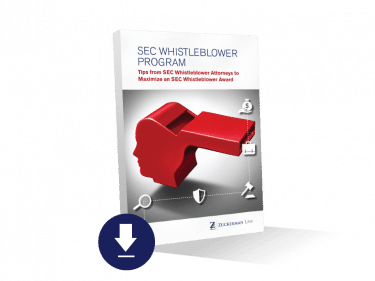A Law360 article titled Dodd-Frank Whistleblower Debate May Be High Court Bound quotes DC whistleblower lawyer Jason Zuckerman about interpretive guidance that the SEC issued earlier this week about the scope of Dodd-Frank whistleblower protection.
The article quotes Zuckerman’s analysis of recent federal court ruling and SEC guidance concerning Dodd-Frank’s anti-retaliation provision:
- “I think it is very likely that we will soon see a circuit split on this issue and that the issue will go before the Supreme Court,” said Zuckerman Law’s Jason Zuckerman, who represents whistleblowers.
- “I think it will be very helpful to corporate whistleblowers because courts are likely to defer to the SEC’s interpretation of the scope of the anti-retaliation provisions under the Dodd-Frank Act where there’s ambiguity,” Zuckerman said. “It’s a lot more persuasive to have actual SEC interpretive guidance.”
- “I believe the Supreme Court will agree with the SEC’s broad construction of the anti-retaliation provisions of the Dodd-Frank Act,” Zuckerman said.
The experienced whistleblower lawyers at Zuckerman Law represent whistleblowers worldwide before the SEC under the Dodd-Frank SEC Whistleblower Program. The firm has a licensed Certified Public Accountant and Certified Fraud Examiner on staff to enhance its ability to investigate and disclose complex financial fraud to the SEC, and two of the firm’s attorneys served in high-level position at a government agency that protects whistleblowers. Firm Principal Jason Zuckerman has been named by Washingtonian Magazine as a “Top Whistleblower Lawyer” and the firm has been ranked by U.S. News as a Tier 1 Firm in Labor & Employment Litigation.
Whistleblower law firm Zuckerman Law has substantial experience investigating securities fraud schemes and preparing effective submissions to the SEC concerning a wide range of federal securities violations, including:
- Accounting fraud;
- Investment and securities fraud;
- EB-5 investment fraud;
- Manipulation of a security’s price or volume;
- Fraudulent securities offerings and Ponzi schemes;
- Unregistered securities offerings;
- Investment adviser fraud;
- False or misleading statements about a company or investment;
- Inadequate internal controls; and
- Violations of auditor independence rules.
For more information about the SEC Whistleblower Program, download our free book:










